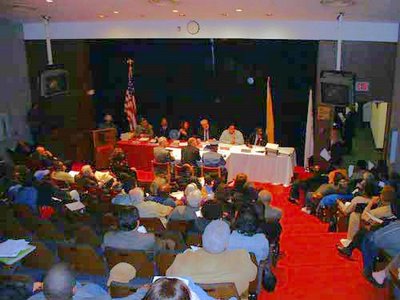Public Safety, Revelations and Recriminations
The City Council’s first “working conference” meeting Monday (April 10, 2006), on the topic of public safety, produced some revelations and a number of recriminations.
 The one-topic meetings, as envisioned in the council’s new “Rules of Order,” are meant to be used for policy development or similar matters.
The one-topic meetings, as envisioned in the council’s new “Rules of Order,” are meant to be used for policy development or similar matters.
 Monday’s roster of experts included Police Chief Edward Santiago, Public Affairs and Safety Director Martin Hellwig and Union County Prosecutor Theodore Romankow. A shifting crowd, from about 50 to 100, came to Muhlenberg Regional Medical Center’s Centennial Hall to listen to the exchanges between council members and the law enforcement officials.
Monday’s roster of experts included Police Chief Edward Santiago, Public Affairs and Safety Director Martin Hellwig and Union County Prosecutor Theodore Romankow. A shifting crowd, from about 50 to 100, came to Muhlenberg Regional Medical Center’s Centennial Hall to listen to the exchanges between council members and the law enforcement officials.
A public comment portion scheduled first for 15 minutes, but extended to 30 minutes, went on for almost two hours as citizens reacted to what they heard.
Gangs, gun violence, drug dealing and parolees led the list of worries for both law enforcement and residents.
“We have a serious gang problem in Plainfield,” Romankow said, citing documentation of over 300 gang members in the city, out of 1,200 in the county.
Romankow said surveillance cameras in a one-mile-square section of the West End would go far to solve the problem. He also suggested that Plainfield could take advantage of national data bases on known gang members.
Councilwoman Linda Carter said the city must find out how guns are coming to the city and how gun violence can be quelled.
“You have a gun in your hand, you shoot that gun - I don‘t want you in Plainfield,” she said.
Strategies to cope with drug dealing ran the gamut from suggestions to publicize names of outside drug customers in their hometown newspapers to blasting classical music in troubled neighborhoods. City Council President Ray Blanco suggested the musical ploy, which he said worked in many cities across the world, “to get people to move out of town.”
Romankow replied that various kinds of legislation such as gang-free zones had reduced crime, but added, “I don’t know about classical music - I’ll pass on it.”
 On parolees, Santiago brought along three thick binders that he said contained information on people returning to Plainfield. He said every day a parolee comes back to Plainfield and the recidivism rate is 90 percent, meaning the parolees will likely repeat crimes once they return to the community.
On parolees, Santiago brought along three thick binders that he said contained information on people returning to Plainfield. He said every day a parolee comes back to Plainfield and the recidivism rate is 90 percent, meaning the parolees will likely repeat crimes once they return to the community.
When it came time for residents to speak, many agreed with the council members and law enforcement officials on needs for more innovations such as Spanish-speaking police staff, not only for crime reports but even traffic accidents.
“P.S., you’ve got to get more people here who speak Spanish 24 hours a day,” Romankow said.
But later many objected to Romankow’s use of the term “animals” to describe heartless gang murderers.
Anti-gun violence advocate Stephanie Alexander, whose daughter was paralyzed in a shoot-out and whose brother was killed in another incident, preached forgiveness.
“We got to learn to love those that don’t love they self,” she said.
Resident Rickey Williams told Romankow he should get on his knees and pray for forgiveness for his remark, but Romankow said, “I don‘t think God is going to punish me.”
Romankow said his job is to prosecute people that need to be prosecuted.
“I don’t love any murderer,” he said.
 The one-topic meetings, as envisioned in the council’s new “Rules of Order,” are meant to be used for policy development or similar matters.
The one-topic meetings, as envisioned in the council’s new “Rules of Order,” are meant to be used for policy development or similar matters. Monday’s roster of experts included Police Chief Edward Santiago, Public Affairs and Safety Director Martin Hellwig and Union County Prosecutor Theodore Romankow. A shifting crowd, from about 50 to 100, came to Muhlenberg Regional Medical Center’s Centennial Hall to listen to the exchanges between council members and the law enforcement officials.
Monday’s roster of experts included Police Chief Edward Santiago, Public Affairs and Safety Director Martin Hellwig and Union County Prosecutor Theodore Romankow. A shifting crowd, from about 50 to 100, came to Muhlenberg Regional Medical Center’s Centennial Hall to listen to the exchanges between council members and the law enforcement officials.A public comment portion scheduled first for 15 minutes, but extended to 30 minutes, went on for almost two hours as citizens reacted to what they heard.
Gangs, gun violence, drug dealing and parolees led the list of worries for both law enforcement and residents.
“We have a serious gang problem in Plainfield,” Romankow said, citing documentation of over 300 gang members in the city, out of 1,200 in the county.
Romankow said surveillance cameras in a one-mile-square section of the West End would go far to solve the problem. He also suggested that Plainfield could take advantage of national data bases on known gang members.
Councilwoman Linda Carter said the city must find out how guns are coming to the city and how gun violence can be quelled.
“You have a gun in your hand, you shoot that gun - I don‘t want you in Plainfield,” she said.
Strategies to cope with drug dealing ran the gamut from suggestions to publicize names of outside drug customers in their hometown newspapers to blasting classical music in troubled neighborhoods. City Council President Ray Blanco suggested the musical ploy, which he said worked in many cities across the world, “to get people to move out of town.”
Romankow replied that various kinds of legislation such as gang-free zones had reduced crime, but added, “I don’t know about classical music - I’ll pass on it.”
 On parolees, Santiago brought along three thick binders that he said contained information on people returning to Plainfield. He said every day a parolee comes back to Plainfield and the recidivism rate is 90 percent, meaning the parolees will likely repeat crimes once they return to the community.
On parolees, Santiago brought along three thick binders that he said contained information on people returning to Plainfield. He said every day a parolee comes back to Plainfield and the recidivism rate is 90 percent, meaning the parolees will likely repeat crimes once they return to the community.When it came time for residents to speak, many agreed with the council members and law enforcement officials on needs for more innovations such as Spanish-speaking police staff, not only for crime reports but even traffic accidents.
“P.S., you’ve got to get more people here who speak Spanish 24 hours a day,” Romankow said.
But later many objected to Romankow’s use of the term “animals” to describe heartless gang murderers.
Anti-gun violence advocate Stephanie Alexander, whose daughter was paralyzed in a shoot-out and whose brother was killed in another incident, preached forgiveness.
“We got to learn to love those that don’t love they self,” she said.
Resident Rickey Williams told Romankow he should get on his knees and pray for forgiveness for his remark, but Romankow said, “I don‘t think God is going to punish me.”
Romankow said his job is to prosecute people that need to be prosecuted.
“I don’t love any murderer,” he said.
--Bernice Paglia
KEYWORDS: public safety, council


<< Home